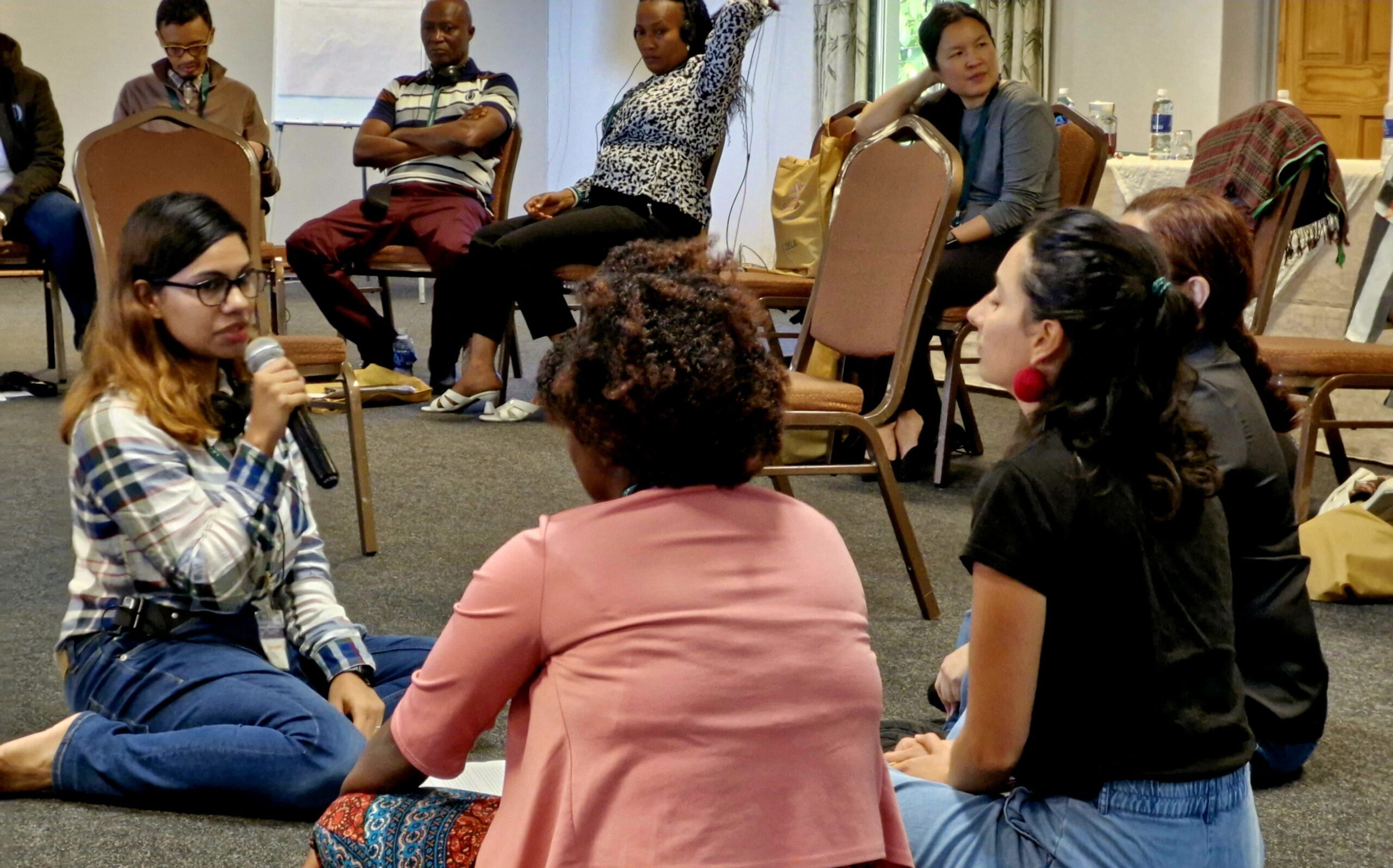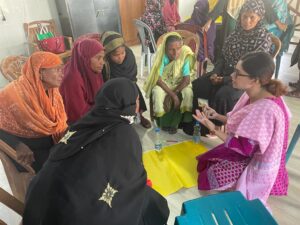
This is a special edition of the network member profile series. On the sidelines of the Gender Learning Exchange in Zimbabwe’s expansive highlands, we caught up with Fariha Jesmin, a committed activist empowering rural women in Bangladesh. In this issue, Fariha shares how gender inclusion is reflected in their land, environmental, and climate action. Working with Badabon Sangho, Fariha emphasizes that land rights are contingent upon women’s rights.
This interview has been copy edited for brevity.

Fariha Jesmin
I am Fariha Jesmin, a Senior Program Officer at Badabon Sangho in Bangladesh. Our organization is dedicated to the women’s rights movement, focusing on womens’ land and water-bodies rights and voices. It has a group-based approach and governance. We address issues such as how women are deprived of their land rights and advocate for their empowerment. Generally, women are deprived from the land and water-bodies ownership, even from the inheritance properties.
Having seen firsthand the effects of environmental degradation, social inequalities related to land rights, or the advocacy of influential figures like environmental activists, social workers, or community leaders to draw attention to these concerns, I have decided to join the battle for land and environmental justice. Spending time in the community usually inspires us to take action when we see the link between environmental sustainability and social justice and how collective actions can help our objectives.
Badabon Sangho works in rural areas, and while working at the community level, we face gender-based discrimination and systematic challenges, mostly due to cultural barriers. Our clear approach is to mobilize and organize women and girls in groups, federations, educate them on rights and entitlements, facilitate collective actions like protests, rallies and support them with legal assistance. By the way of experiences, you will find that sometimes the men do not want the women to come forward in the meetings, and they don’t want them to speak up for their rights or for justice. It’s quite a challenge because leadership in the communities is dominated by men. Due to these circumstances, women feel shy and do not come forward in meetings.
“We believe that women are in charge of their own lives, but it takes time to make them leaders if they believe that they are being dominated by the men in society.”
We provide different kinds of feminist leadership training, coaching and sessions such as courtyard sessions regarding land ownership, land literacy, gender-based training, and the discrimination they’re facing. In order to effectively support women, we occasionally have to face the “Dalal,” or the middleman who tries to stand in the way of those in need of assistance. We also engage with political leaders and other stakeholders on discussions on women’s issues, though it is hard to get their positive motivation. There will be new leaders, and it is imperative that they comprehend the difficulties that women are currently facing.

Community meeting with women fisherfolk.
We have different strategies, but the one we have seen to work best is separating men and women in different meetings or seminars, awareness training, or
capital capacity building training to address the issue of women not feeling comfortable speaking about their challenges or needs in the presence of men.
And also, we consider the timing of the meetings for women so that it doesn’t interfere with their other duties in the family, such as household chores.
Another tactic we’ve used is to enlist the assistance of qualified consultants who can spot gaps in our knowledge and attempt to supply us with various training modules so group leaders and volunteers can conduct the training in a way that allows us to know our weaknesses and what kind of approach to take in front of women and the community. This helps group leaders as facilitators understand how to conduct training related to topics like gender-based training, discrimination against women, land literacy, land grabbing, feminist collective actions.
Since women are individuals and citizens of every nation, it is crucial that they have ownership of land. For the following reasons women should have ownership on land and water-bodies. Firstly, land ownership gives women respect and status in society. Secondly, economical security comes by way of land ownership. Women have control over income and expenses if they have ownership. Thirdly, by the way of our experiences, we found that ownership gives them leadership and voice, particularly articulation and public speaking capacity. We coach them how to present their land ownership documentation and explain it for claiming rights.
In most of the cases in Bangladesh, we see at the community level that women are deprived of education and in the early stage they are married off and they are not allowed to study further. When they’re deprived of their education, they do not know about the documentation process. They are unaware of the procedures of ownership documentation. As a result, they lose their lands or cannot claim their inherited lands.
At the community level, if a woman’s land is taken without her consent, she might not even know about it. We often see different companies or infrastructure projects grabbing land without compensating the owner. Whether it’s inherited property or their husband’s, influential community members or even family might take advantage and seize the land without the woman’s consent.
“Ensuring women have control over their land helps them survive and live better lives. In most cases, women with land ownership can be less affected by gender-based violence.”
Finally, single mothers, separated, divorcees, widows owning land can provide women with opportunities to grow crops, feed their family’s members or find other sources of income.
During this session, we transfer knowledge of land literacy to make them aware of their rights. We also engage with leaders and stakeholders to include gender-based violence in their discussions, and highlight the challenges and gaps we discovered during community meetings. With the women, we try to build collective action and try to encourage them to know more about their rights and also build movements for change.